The Baby Carriage Blu-ray Movie
HomeThe Baby Carriage Blu-ray Movie 
BarnvagnenCriterion | 1963 | 96 min | Not rated | No Release Date
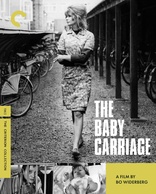
Price
Movie rating
6.4 | / 10 |
Blu-ray rating
| Users | 0.0 | |
| Reviewer | 4.0 | |
| Overall | 4.0 |
Overview
The Baby Carriage (1963)
A young factory worker finds her way toward independence as she weathers unexpected pregnancy, learns hard lessons from relationships with two very different men, and leaves behind the only home she has ever known.
Starring: Inger Taube, Thommy Berggren, Lars Passgård, Ulla Akselson, Lena BrundinDirector: Bo Widerberg
| Foreign | Uncertain |
| Drama | Uncertain |
Specifications
Video
Video codec: MPEG-4 AVC
Video resolution: 1080p
Aspect ratio: 1.33:1
Original aspect ratio: 1.37:1
Audio
Swedish: LPCM Mono (48kHz, 24-bit)
Subtitles
English
Discs
Blu-ray Disc
Single disc (1 BD)
Playback
Region A (locked)
Review
Rating summary
| Movie | 4.0 | |
| Video | 4.5 | |
| Audio | 4.0 | |
| Extras | 2.5 | |
| Overall | 4.0 |
The Baby Carriage Blu-ray Movie Review
Reviewed by Jeffrey Kauffman February 27, 2024 Note: This film is available on Blu-ray as part of the Bo Widerberg's New Swedish Cinema collection from Criterion.
Any conversation about Swedish film in the sixties is bound to be dominated by the titanic figure of Ingmar Bergman, but there were
other
Swedish filmmakers working during that decade, of course, and as is alluded to on the back cover of Criterion's four disc collection
of
films by
Bo Widerberg as well as some on disc supplements included in the set, there was an undeniable bit of a "Bergman backlash" at work in some of
Widerberg's offerings in particular. Widerberg will
probably be best remembered by Western audiences for 1967's
Elvira Madigan, a film which escaped the confines of neighborhood "art houses" to become a worldwide cinema phenomenon, one
which,
among
other achievements, managed to get a theme by some guy named Wolfgang Amadeus Mozart or something like that significant radio airplay
(including
making the Top 40 on Billboard's so-called "Easy Listening" charts), courtesy of
its haunting use of part of a "Wolfie" piano concerto as a leitmotif. While some cineastes may want to quibble with the back cover's
further assertion that the fact that
Widerberg's films merge "social realist themes" that focus on "the struggles of ordinary people" somehow sets him apart from Bergman, those
same cineastes may find that very description of Widerberg's oeuvre a questionable thesis in and of itself to begin with (for example, was
Elvira
Madigan, a 19th century circus
tightrope
performer,
an "ordinary
person"?). All of this said, Widerberg's films
are nonetheless markedly different in both tone and presentational aspects from Bergman's monolithic work, and the four films aggregated in this
collection are all fascinating viewing experiences in their own ways.
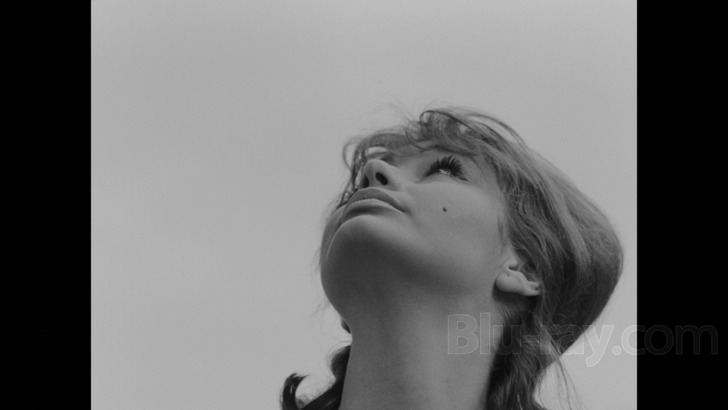
As some of the appealing documentation in Criterion's insert booklet gets into, there may be just a bit of a Summer with Monika-ish vibe to this film, which also features an unplanned pregnancy. While there actually is another Ingmar Bergman film with at least a tangential connection to unwed motherhood, it's Bergman's very little remembered 1958 opus Brink of Life (as with Summer with Monika, included in Criterion's massive Ingmar Bergman's Cinema, which I'm slowly but surely reviewing disc by disc, though I haven't gotten to Brink of Life yet as of the writing of this review). That may put a certain lie to the idea of Widerberg forging some new territory with The Baby Carriage, at least with regard to plot mechanics, since this film indeed focuses on a young woman named Britt Larsson (Inger Taube), who finds herself "in trouble" after an amorous assignation with aspiring rock 'n' roll singer Robban (Lars Passgård). But for just one manifest difference (out of many) between Widerberg's presentational proclivities and Bergman's, it's kind of impossible to imagine Ingmar Bergman beginning a film with over a minute and a half of black screen (i.e., no images) with nothing but the sounds of a fantastically swingin' jazz trio led by Jan Johansson (who ironically would go on to score Bergman's The Touch, also included in the gargantuan Criterion set devoted to Bergman).
Another major difference between Widerberg and Bergman becomes apparent in not just the almost random, at times discursive, way the narrative unfolds, which includes a whole second dalliance with a character named Björn (Thommy Berggren), but courtesy of some editing choices that certainly show what some of the supplements on various discs mention was the huge influence of the French New Wave on Widerberg. While some of these stylistic flourishes include quasi-montages and quick cutting that may recall such efforts as Breathless, there are other, arguably even weirder, moments as in an early use of dissolves as Britt reads a magazine. That technique might have been used "traditionally" to offer an elision of sorts, documenting a character reading a really long article or something like that, but here it's inserted for no discernable reason, with no "jump" in Britt's narration of what she's reading.
And while there is definitely some of the psychodrama that typically informs a lot of Bergman's work, this is in fact a less "interior" feeling film than a lot of Bergman's films, and despite the kind of melancholic undertone that suffuses the story, it actually ends on a note of relative hope, depicting a young Swedish woman forging her own way and finding her own strength. The only thing that ironically may slightly undercut this "character arc" is that fact that Sweden seems to be depicted as rather tolerant of unwed motherhood, with at least little of the stigma that some other cultures attribute to it.
The Baby Carriage Blu-ray Movie, Video Quality 
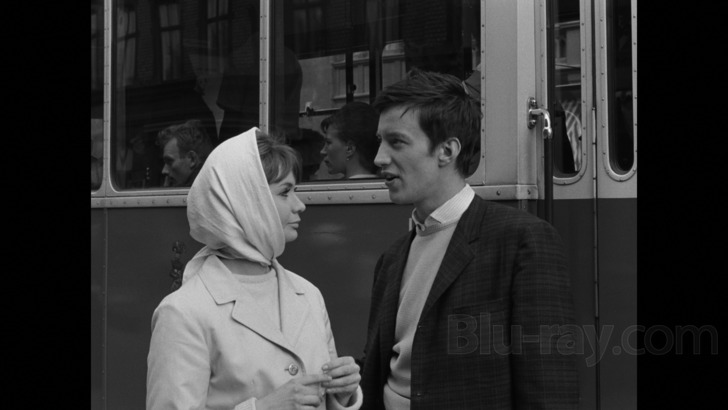
The Baby Carriage is presented on Blu-ray courtesy of the Criterion Collection with an AVC encoded 1080p transfer in 1.33:1. Criterion's insert booklet contains the following information on the transfer:
The Baby Carriage is presented in the aspect ratio of 1.33:1. This new digital master was created in high definition from the 35 mm original camera negative. The original monaural soundtrack was remastered from the 35 mm magnetic track.This film was lensed by the great Jan Troell, a name many will know courtesy of his own directorial duties on such gorgeous films as The Emigrants and The New Land . He was shooting in black and white here, as was the custom in Sweden at the time (Ruben Östlund mentions in a supplement on this disc that it was actually Widerberg's Elvira Madigan that finally got Swedes and the Swedish film industry to "accept" a color film as "art", or at least artful). With some framings that you'd definitely never see in Bergman (see screenshot 1), this is a whirlwind to watch at times, with beautifully consistent contrast and really almost elegantly modulated gray scale supporting a style which is almost a combo platter of nouvelle vague and British "kitchen sink" dramatics. Commendably, there's surprisingly little difference in clarity and fine detail levels between what I would assume were more controllable interior scenes, and a lot of sequences shot out on various streets and other industrialized locations. I noticed no real damage of any import, and grain also resolves nicely throughout.
The Baby Carriage Blu-ray Movie, Audio Quality 
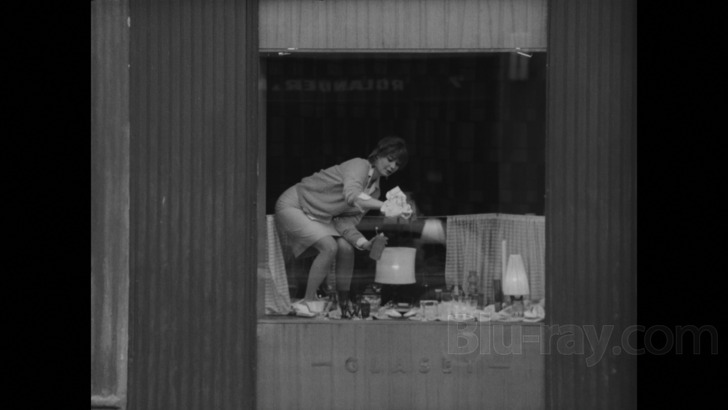
The Baby Carriage features an LPCM Mono track in Swedish, though one of the track's most distinctive features is the really enjoyable jazz score by Jan Johansson. There's just the slightest bit of distortion associated with some of the forceful block chords in the piano, but otherwise this track offers a nicely clear and clean experience. The actual sound editing is rather interesting, with those jazz trio cues kind of coming and going willy-nilly, combined with some ambient environmental effects in the some material. Occasionally ambient environmental effects like some brief birdsong that awakens Britt one morning can seem more than a bit artificial sounding. Dialogue is presented cleanly and clearly throughout. Optional English subtitles are available.
The Baby Carriage Blu-ray Movie, Special Features and Extras 
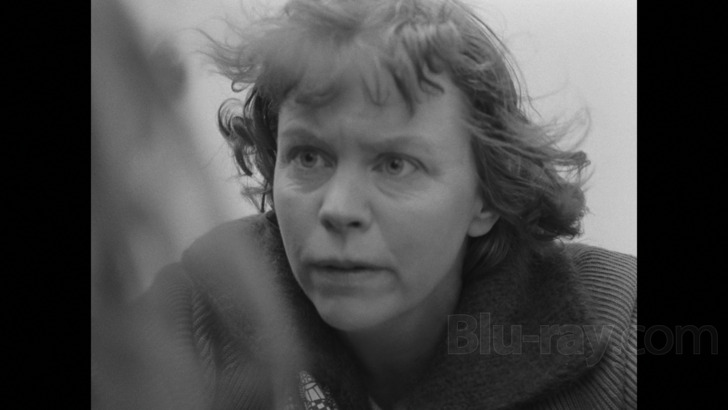
- Ruben Östlund (HD; 14:52) features the filmmaker discussing various tethers to Widerberg, including producer Kalle Boman, as well as Widerberg's impact on Swedish cinema.
- The Boy and the Kite (HD; 30:03) is a charming 1962 short by Widerberg and Jan Troell.
- Introduction by Jan Troell (HD; 2:32) is subtitled in English.
- Bo Widerberg (HD; 1:31) is snippet from a 1963 Swedish tv program with Widerberg.
The Baby Carriage Blu-ray Movie, Overall Score and Recommendation 
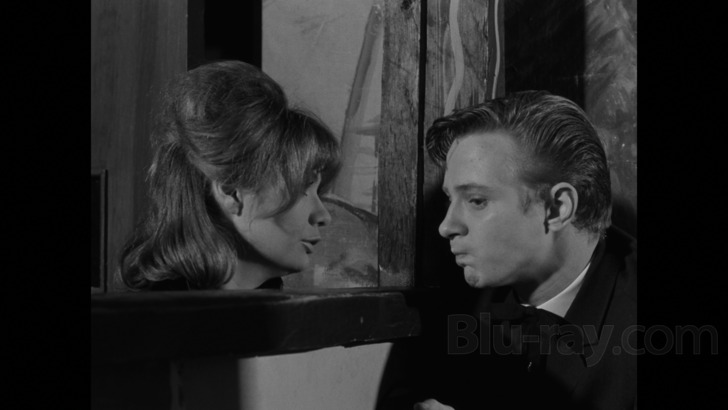
Britt is frankly maybe charitably termed a naïf in this story, and Widerberg's kind of perplexing decision to have her be almost catatonic at times, especially in her early interactions with Björn, but this is still a really remarkable film especially from what might be termed structural and mise en scène perspectives, and Taube (who later was Widerberg's partner) is quite effective in a somewhat difficult role where audience sympathies may not be entirely with Britt. Technical merits are first rate, and the supplements very interesting. Highly recommended.
Similar titles
Similar titles you might also like
(Still not reliable for this title)

Falcon Lake
Slipcover in Original Pressing
2022

After the Rehearsal
Efter repetitionen
1984

Muriel, or the Time of Return
Muriel ou le temps d'un retour
1963

To Joy
Till glädje
1950

Mademoiselle
1966

Phoenix
2014

Graduate First
Passe ton bac d'abord
1979

Sawdust and Tinsel
Gycklarnas afton
1953

This Is Not a Burial, It's a Resurrection
2019

The Wild Pear Tree
Ahlat Ağacı
2018

The Rite
Riten / The Ritual
1969

Le vent d'est
Wind from the East
1970

The Night of the Shooting Stars
La notte di San Lorenzo
1982

Thirst
Törst
1949

Out 1
Out 1, noli me tangere
1971

Taipei Story
青梅竹馬 / Qing mei zhu ma
1985

Port of Call
Hamnstad
1948

Je tu il elle
I You He She
1974

Les rendez-vous d'Anna
The Meetings of Anna
1978

Stray Dogs
郊游 / Jiao you
2013